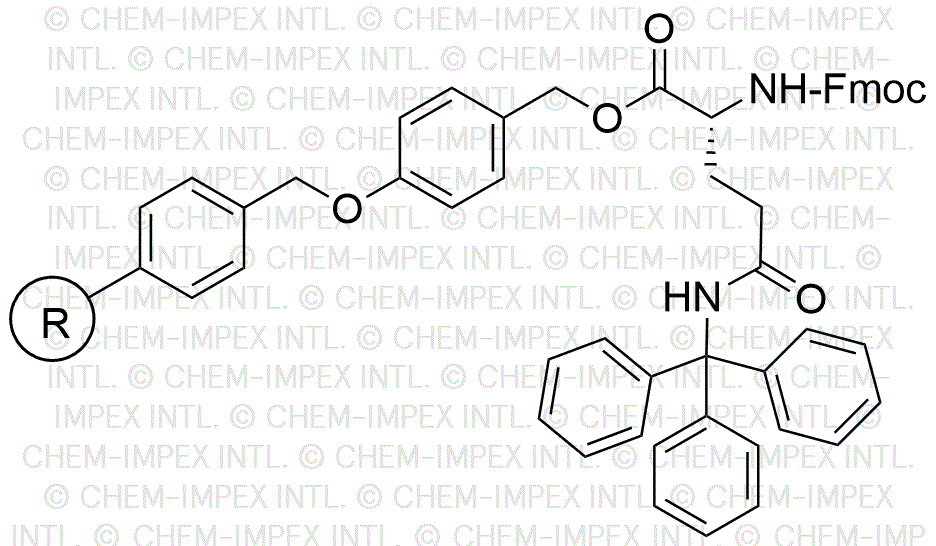Na-Fmoc- Nd-trityl-D-glutamine 4-alkoxybenzyl alcohol resin is widely utilized in research focused on:
- Peptide Synthesis: This resin serves as a solid support in the synthesis of peptides, allowing for efficient coupling and deprotection steps, which is crucial in developing new pharmaceuticals.
- Drug Development: Researchers use this resin to create peptide-based drugs, benefiting from its stability and ease of handling during the synthesis process.
- Bioconjugation: The resin facilitates the attachment of peptides to other biomolecules, enhancing the development of targeted therapies in cancer treatment.
- Protein Engineering: It is employed in the modification of proteins, helping scientists create variants with improved properties for research and therapeutic applications.
- Custom Resin Production: This compound allows for the customization of resin properties, enabling researchers to tailor their experiments to specific needs, which is a significant advantage over standard resins.
General Information
Properties
Safety and Regulations
Applications
Na-Fmoc- Nd-trityl-D-glutamine 4-alkoxybenzyl alcohol resin is widely utilized in research focused on:
- Peptide Synthesis: This resin serves as a solid support in the synthesis of peptides, allowing for efficient coupling and deprotection steps, which is crucial in developing new pharmaceuticals.
- Drug Development: Researchers use this resin to create peptide-based drugs, benefiting from its stability and ease of handling during the synthesis process.
- Bioconjugation: The resin facilitates the attachment of peptides to other biomolecules, enhancing the development of targeted therapies in cancer treatment.
- Protein Engineering: It is employed in the modification of proteins, helping scientists create variants with improved properties for research and therapeutic applications.
- Custom Resin Production: This compound allows for the customization of resin properties, enabling researchers to tailor their experiments to specific needs, which is a significant advantage over standard resins.
Documents
Safety Data Sheets (SDS)
The SDS provides comprehensive safety information on handling, storage, and disposal of the product.
Product Specification (PS)
The PS provides a comprehensive breakdown of the product’s properties, including chemical composition, physical state, purity, and storage requirements. It also details acceptable quality ranges and the product's intended applications.
Certificates of Analysis (COA)
Search for Certificates of Analysis (COA) by entering the products Lot Number. Lot and Batch Numbers can be found on a product’s label following the words ‘Lot’ or ‘Batch’.
*Catalog Number
*Lot Number
Certificates Of Origin (COO)
This COO confirms the country where the product was manufactured, and also details the materials and components used in it and whether it is derived from natural, synthetic, or other specific sources. This certificate may be required for customs, trade, and regulatory compliance.
*Catalog Number
*Lot Number
Safety Data Sheets (SDS)
The SDS provides comprehensive safety information on handling, storage, and disposal of the product.
DownloadProduct Specification (PS)
The PS provides a comprehensive breakdown of the product’s properties, including chemical composition, physical state, purity, and storage requirements. It also details acceptable quality ranges and the product's intended applications.
DownloadCertificates of Analysis (COA)
Search for Certificates of Analysis (COA) by entering the products Lot Number. Lot and Batch Numbers can be found on a product’s label following the words ‘Lot’ or ‘Batch’.
*Catalog Number
*Lot Number
Certificates Of Origin (COO)
This COO confirms the country where the product was manufactured, and also details the materials and components used in it and whether it is derived from natural, synthetic, or other specific sources. This certificate may be required for customs, trade, and regulatory compliance.


